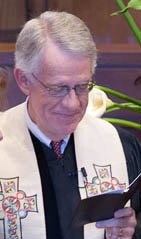It’s like being kicked in the stomach, wrestled to the ground, robbed of hopes and dreams.
One of the struggles of the past few weeks for Anita and me has been an effort to balance the reality of what we are facing with hope for the future. We have been fortunate to have friends in the medical professional who have helped us interpret the reality of the severity of pancreatic cancer.
Time and again, over the years, I have seen people confront tragic news with outright denial. Denial has its temporary place in helping us deal with current circumstances, but persistent denial is unhealthy, it blocks the path to dealing in a redemptive way with the situation at hand.
But, from the beginning of my diagnosis, we have talked with medical professionals, researched legitimate websites, and read reams of material about what we are facing. We have looked reality in the face, and it is ugly! At times this has left us devastated and depressed, with little hope.
“As long as there’s life, there’s hope.” That’s the old adage that we’ve heard all our lives.
But the opposite is also true: “As long as there’s hope, there’s life.” Our faith is a hope-filled faith, hope that shines in the darkness of reality, hope that transcends the brokenness of life.
This hope is not a naïve kind of hope, not the Alice in Wonderland--close your eyes--believe anything you want--and it will come to pass kind of hope. Nor is it the kind of hope described by Nietzsche as “the worst of all evils because it prolongs the torments of man.”
What is hope? For people of faith, it involves facing the reality of the current situation with honesty and openness, knowing that God is still in charge, that His plans for us are wise and good, and that He will not abandon us in the midst of our struggles.
So, Anita and I have also tried, with God’s help and yours, to balance reality with hope. When I first shared the news with our staff in the CBF office and our field personnel around the world, I told them that I continue to hold on to the prospect of a miracle. My God is a miracle worker--but my faith is not dependent on Him performing a miracle. So many of you have responded that while you agree with my theology, you are praying for a miracle! And so am I!
And that’s part of the hope that has helped balance the reality of what I’m facing. But the other part of the equation has to do with hope that is not temporal, but eternal. I am confident, with the Apostle Paul, that “the one who began a good work in you will perfect it until the day of Christ” (Philippians 1:6).
I’m also convinced, with Paul, that if our hope is for this life only, we are among all people most miserable. And so, my definition of hope has moved beyond my being healed today to a more eternal dimension.
So, here I am: acknowledging the severity of the medical challenges I face, but with my hand tightly in the hand of God, holding on to and being held by the hope He instills. Hope has become “the anchor of [my] soul, both sure and steadfast” (Hebrews 6:19).
Is it easy? Not at all. But, for me, today, it is enough!

***************
Back to Jack Snell 411.

1 comment:
I have been at a loss for words ever since I received the e-mail regarding Jack's illness. After avoiding the topic for several weeks, a trait that Jack will remember I inherited from my father, I started reading the updates and comments left by others. Jack and Anita are two of the most faithful people I have ever known. I am not surprised at all to hear of the number of people they have touched with God's Grace. I have to stop now, I am in tears again.
Post a Comment